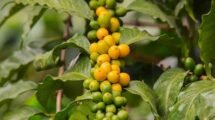Wrongly weather predictions put Kodagu, and Chikkamagaluru coffee producers at risk.
The India Meteorological Department’s (IMD) ‘sadly’ erroneous weather forecast has put coffee producers in Karnataka in peril.
Coffee growers in Karnataka prepared for rainfall on June 1 based on the Met Department’s forecast of an early monsoon. However, as of June 17, the coffee estates in Kodagu, Chikkamagaluru, and Hassan districts have yet to receive any rain.
Also Read | Karnataka coffee regions start receiving pre-monsoon nicknamed ‘blossom showers’.
Estates prepared for monsoon on June 1st
Farmers cut off branches of shade trees in preparation for the June 1 monsoon, exposing fragile berries to summer-like sunlight.
With the monsoon expected to arrive in the first week of June, most coffee producers began shade regulation by pruning the branches of secondary shade trees on their farms to assure optimum sunshine on the plants during the monsoon. Coffee plants are being subjected to high heat and summer-like sunlight in the lack of rain.
Shade lopping (called dadap lopping because dadaps are fast-growing trees of the genus Erythrina) is done just before or at the start of monsoon because maintaining thick shade during monsoon can disrupt the free flow of oxygen in the plantation, resulting in berry dropping, wet foot condition, and stem rotting.
‘The entire coffee belt was ready for the monsoon on June 1, explains Mandanna of Subramhanya Estate in Suntikoppa, Kodagu district. Unfortunately, the Met Department’s weather forecast has gone insane. A delayed monsoon has added to the coffee-growing community’s fears.’
According to Mr. Mandanna, coffee farms should have received 5 to 6 inches of rain in June, but they have yet to receive any rain so far.
‘More than half of June is gone, and the monsoon has yet to arrive.’ Rains are crucial for berry development as well as keeping white stem borer away from coffee plants, according to Mr. Mandanna, who is a member of the Coffee Board.
Effects of Delayed Monsoon
Shirish Vijayendra, a Mudigere planter and past chairman of the Karnataka Planters’ Association, stated, ‘A delayed monsoon would have a negative impact on the coffee production this year.’ Not only has it affected coffee production, but it has also had an impact on pepper flowering, corn formation, and rice agriculture in most sections of Karnataka. The majority of the days are bright and sunny as if we are still in summer. Most crops, including coffee, would suffer as a result.’
‘The delayed monsoon has increased our issues,’ said Anil Kumar Bhandari, President of India Coffee Trust (ICT) and a prominent planter from Suntikoppa. If the rains are delayed for another 4 to 6 days, it will have a substantial impact on productivity due to poor crop formation.’
Also Read | Heavy rains in coffee-producing states are expected to reduce crop size by 10%.
Coffee farmers claim they bought manure in bulk to fertilize and nourish their estates, but the process can only be completed if the soil is moist enough to disperse and absorb the fertilizer.
‘Due to the absence of moisture on the ground, we have yet to apply fertilizers in our orchards,’ worried Sindhu Jagdish, a small plantation farmer from Ponnampet in Kodagu district.


















Add Comment